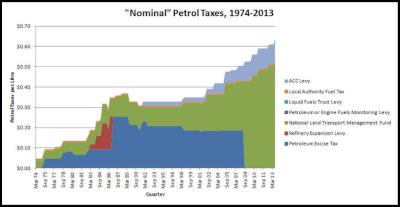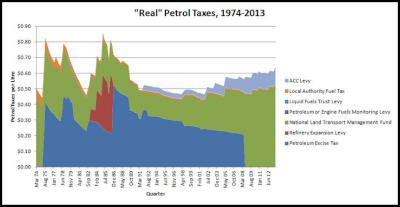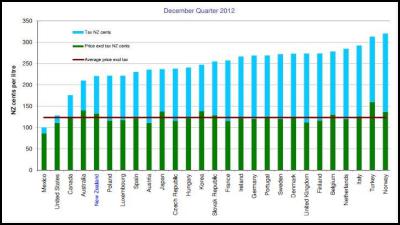Auckland Transport Blog: 3 cents a litre, y’all
3 cents a litre, y’all
by John
Polkinghorne
July 1st, 2013
http://transportblog.co.nz/2013/07/01/3-cents-a-litre-yall/
3 cents doesn’t get you much these days. But when you’re talking 3 cents a litre, times 2.5 million cars, using 1,000 litres a year, it starts to add up. As of today, folks, the excise duty on petrol has been lifted by 3 cents a litre (from 50.5 cents to 53.5 cents), and that’s how much more you’ll be paying at the pump.
Where does the money go? Straight into the National Land Transport Fund. What’s the main reason for the increase? Current National Party policy: the “Roads of National Significance”. We’ve had plenty to say about those elsewhere on the blog, so I won’t discuss them here. National is planning to increase the excise by another three cents next year, and again the year after that.
I should point out that I’m all in favour of these increases, although I don’t necessarily agree with the way they’re being spent. That’ll have to wait for future posts.
I’ll just note that petrol taxation has had a funny ol’ history. These days it’s a more straightforward system than it used to be, and it’s essentially based on “user pays”, with most of the money going to the National Land Transport Fund – which helps to pay for road maintenance and construction, and of course a token amount for public transport. A bit goes to ACC to help cover the costs of accidents on the road. The graph below uses MED data to show how these taxes have changed over time. Note that GST isn’t included here, but of course we do pay that on petrol as well.

Click for big version.
The graph above excludes the effect of inflation, i.e. it’s showing the stats in “nominal” dollars. But of course a dollar went further in 1974 than it does today, so if you allow for inflation – converting everything to today’s dollars, or “real” dollars – you get a different looking graph:

Click for big version.
Taxes were highest in the mid-70s and mid-80s, but they’ve been increasing fairly steadily since the early 2000s, faster than general inflation. This seems set to continue, given the increases that have been pencilled in for the next two years.
Just one more reason why you can expect petrol prices to increase faster than other prices!
It’s also worth remembering that New Zealand has lower petrol prices than most of the OECD which is primarily a result of the level of tax charged. The MBIE have done some comparisons on this, with the latest one being up to the December Quarter of 2012:

Click for big version.
ENDS


 Binoy Kampmark: Catching Pegasus - Mercenary Spyware And The Liability Of The NSO Group
Binoy Kampmark: Catching Pegasus - Mercenary Spyware And The Liability Of The NSO Group Ramzy Baroud: The World Owes Palestine This Much - Please Stop Censoring Palestinian Voices
Ramzy Baroud: The World Owes Palestine This Much - Please Stop Censoring Palestinian Voices Dee Ninis, The Conversation: Why Vanuatu Should Brace For Even More Aftershocks After This Week’s Deadly Quakes: A Seismologist Explains
Dee Ninis, The Conversation: Why Vanuatu Should Brace For Even More Aftershocks After This Week’s Deadly Quakes: A Seismologist Explains Martin LeFevre - Meditations: Meditation Without A Method
Martin LeFevre - Meditations: Meditation Without A Method Ramzy Baroud: Israel To Annex The West Bank – Why Now? And What Are The Likely Scenarios?
Ramzy Baroud: Israel To Annex The West Bank – Why Now? And What Are The Likely Scenarios? Binoy Kampmark: The Strawman Of Antisemitism - Banning Protests Against Israel Down Under
Binoy Kampmark: The Strawman Of Antisemitism - Banning Protests Against Israel Down Under